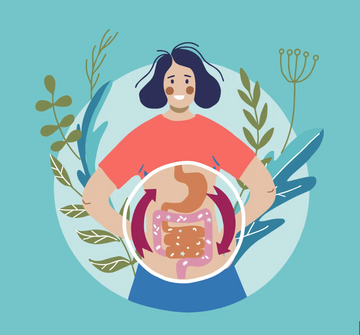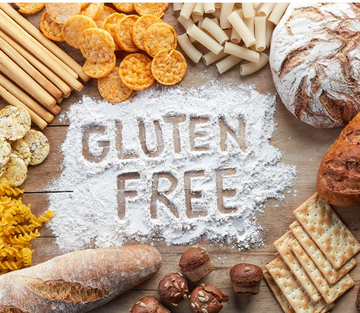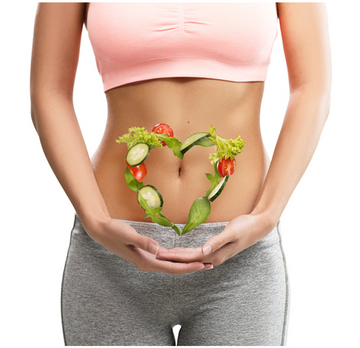Health Articles
Nutrition, Gut Health and its impact on Physical and Mental Health

Performing your best at work and even in your weekly work-outs at the gym or your local sports club requires a combination of intense focus, physical stamina and mental acuity. While the majority of people often prioritise various aspects of their health in the lead up to certain big ‘life events’ such as weddings, milestone birthdays or even getting ‘fit’ for a holiday, one factor that is often overlooked is gut health, which plays a role in both physical and mental wellbeing.
The gut, often referred to as the "second brain," is home to trillions of bacteria and other microorganisms that make up the gut microbiome.1 This complex ecosystem of bacteria has a profound influence on our overall health. Not only does it aid in digestion and nutrient absorption, but it also plays a significant role in regulating the immune system and producing essential neurotransmitters such as serotonin, dopamine, and gamma-aminobutyric acid (GABA), which are crucial for mental wellbeing.2,3
Physical health is a cornerstone of high performance when it comes to our cardiovascular health. However, a strong and well-functioning digestive system is also essential for absorbing the nutrients needed for optimal energy levels, muscle recovery, and endurance.1 Poor gut health can lead to issues such as bloating, gas, indigestion, and nutrient deficiencies, all of which can hinder an individual’s physical performance on the course.
Furthermore, a healthy gut promotes a robust immune system.3 People who frequently travel and are exposed to different environments and climates are particularly susceptible to illnesses. A compromised immune system due to poor gut health can lead to frequent illnesses, decreased energy levels, and prolonged recovery times, all of which can impact an individual’s ability to consistently perform at their best.
While physical health is undoubtedly crucial, mental well-being is equally important. The gut-brain connection, known as the gut-brain axis, highlights the bidirectional communication between the gut and the brain. Scientific research has shown that an imbalance in the gut microbiome can contribute to mental health issues such as anxiety and depression.1
Stress and pressure are inherent in both work and sport. Maintaining a healthy gut can help individuals manage stress levels more effectively and enhance their mental resilience. The production of neurotransmitters in the gut, such as serotonin, often referred to as the "feel-good" neurotransmitter, has a direct impact on mood regulation.2 A healthy gut microbiome ensures the production of an adequate amount of serotonin, leading to improved mental well-being and a more focused and positive mindset on the golf course.
So, how can the everyday person improve their gut health to optimise their physical and mental performance? Here are a few key strategies:
Maintain a balanced diet: A diet rich in fibre, fruits, vegetables, whole grains, and lean proteins supports a diverse gut microbiome. Avoiding processed foods, added sugars, and artificial sweeteners and preservatives is crucial for gut health.
Stay hydrated: Drinking an adequate amount of water helps maintain proper digestion and supports a healthy gut.
Include probiotics and prebiotics: Probiotics are beneficial bacteria that can be found in fermented foods like yogurt, sauerkraut, and kimchi.4 Prebiotics, on the other hand, are non-digestible fibers found in foods like garlic, onions, and bananas that serve as food for the beneficial bacteria in the gut.5
Manage stress: High stress levels can negatively impact gut health. Engaging in relaxation techniques such as meditation, yoga, or deep breathing exercises can help reduce stress and promote a healthy gut.
Get quality sleep: Sufficient sleep is essential for overall health, including gut health. Aim for seven to eight hours of quality sleep each night to support optimal gut function.
At Be Fit Food, we help support the gut health of our customers by only using high-quality, fibre-rich ingredients with a variety of fruits, vegetables and wholegrains. The inclusion of lean proteins in Be Fit Food meals also supports muscle recovery and the necessary building blocks for optimal physical performance. Furthermore, with a range of immune-boosting nutrients, including vitamins, minerals and antioxidants, Be Fit Food meals help strengthen the body’s defense against illness and can help individuals stay healthy and maintain peak performance throughout the year.
Gut health plays a vital role in the physical and mental wellbeing of all individuals. By prioritising a healthy gut through proper nutrition, hydration, stress management, and sleep, it is easy to enhance overall performance on a daily basis. Taking care of gut health not only optimises digestion and nutrient absorption but also improves mental resilience and mood regulation. Incorporating gut health practices into your routine can be the secret weapon for unlocking your full potential and achieving peak performance in every aspect of your life.
By Kate Save, Accredited Practising Dietitian, Exercise Physiologist and Diabetes Educator, CEO and Co-Founder of Be Fit Food.
References:
1. Clapp M, Aurora N, Herrera L, Bhatia M, Wilen E, Wakefield S. Gut microbiota’s effect on Mental Health: The gut-brain axis. Clinics and Practice. 2017;7(4):987. doi:10.4081/cp.2017.987
2. Chen Y, Xu J, Chen Y. Regulation of neurotransmitters by the gut microbiota and effects on cognition in neurological disorders. Nutrients. 2021;13(6):2099. doi:10.3390/nu13062099
3. Wu H-J, Wu E. The role of gut microbiota in immune homeostasis and autoimmunity. Gut Microbes. 2012;3(1):4–14. doi:10.4161/gmic.19320
4. Davani-Davari D, Negahdaripour M, Karimzadeh I, Seifan M, Mohkam M, Masoumi SJ, et al. Prebiotics: Definition, Types, Sources, Mechanisms, and Clinical Applications. Foods. 2019;8(3).
5. Plaza-Diaz J, Ruiz-Ojeda FJ, Gil-Campos M, Gil A. Mechanisms of Action of Probiotics. Advances in Nutrition. 2019;10(suppl_1):S49-S66.




